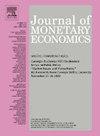Policy transition risk, carbon premiums, and asset prices
IF 4.3
2区 经济学
Q1 BUSINESS, FINANCE
引用次数: 0
Abstract
We analyze the effects of policy transition risk on asset pricing and the green transition using a global two-sector, macro-finance model of climate and the economy. Policy transition risk results from probabilistic changes between three policy states: no, modest, and ambitious carbon pricing. We show that policy transition risk leads to carbon premiums (i.e. higher expected returns on brown than on green assets), especially if the economy is still quite carbon-intensive and close to the temperature cap, and thus accelerate the green transition. Increased transition risk leads to more precautionary saving and falls in the risk-free rate. We offer extensions to deal with physical risks (temperature-related risk of climate disasters and climate tipping), technology transition risk, and more realistic policy tipping with endogenous transition probabilities.
政策转型风险、碳溢价和资产价格
我们使用全球两部门气候和经济宏观金融模型分析了政策转型风险对资产定价和绿色转型的影响。政策转型风险来自三种政策状态之间的概率变化:无碳定价、适度定价和雄心勃勃的碳定价。我们发现,政策转型风险会导致碳溢价(即棕色资产的预期回报高于绿色资产),特别是在经济仍然相当碳密集型且接近温度上限的情况下,从而加速绿色转型。过渡风险增加导致预防性储蓄增加,无风险利率下降。我们提供了扩展来处理物理风险(气候灾害和气候引爆的温度相关风险),技术转型风险,以及更现实的具有内生转移概率的政策引爆。
本文章由计算机程序翻译,如有差异,请以英文原文为准。
求助全文
约1分钟内获得全文
求助全文
来源期刊

Journal of Monetary Economics
Multiple-
CiteScore
7.20
自引率
4.90%
发文量
90
审稿时长
74 days
期刊介绍:
The profession has witnessed over the past twenty years a remarkable expansion of research activities bearing on problems in the broader field of monetary economics. The strong interest in monetary analysis has been increasingly matched in recent years by the growing attention to the working and structure of financial institutions. The role of various institutional arrangements, the consequences of specific changes in banking structure and the welfare aspects of structural policies have attracted an increasing interest in the profession. There has also been a growing attention to the operation of credit markets and to various aspects in the behavior of rates of return on assets. The Journal of Monetary Economics provides a specialized forum for the publication of this research.
 求助内容:
求助内容: 应助结果提醒方式:
应助结果提醒方式:


